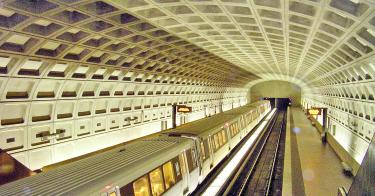Political supporters of the Washington Metropolitan Area Transit Authority have slipped a tax increase into the District’s budget that would make even the most brazen robber baron blush.
The troubled transit system has been pushing local governments to hike its subsidies — already totaling $1.8 billion and accounting for 55 percent of the operating budget — by $500 million.
It is a lot of additional money to throw at a rail system whose average weekday ridership has declined by nearly 140,000 (almost 20 percent) since its peak in 2008, a remarkable feat given that the area’s population has grown by roughly 10 percent in that time.
But the real rub is who gets stuck with the bill: Metro’s competition. The plan would increase D.C.’s tax on ride-hailing services from 1 percent to 4.75 percent. Nearly quintupling the city’s tax on ride-hailing services will have the obvious effect of driving prices up for customers, punishing them for choosing a product more to their liking.
Yet that’s how D.C. Mayor Muriel E. Bowser (D) and WMATA Board Chairman and D.C. Council member Jack Evans (D-Ward 2) proposed to raise a portion of D.C.’s “share” — $178.5 million — of the $500 million in new subsidies Metro craves. The council and mayor already approved their annual $178.5 million contribution for Metro, but the taxes that will ultimately serve as its source must be authorized through the District’s budget process.
It is no wonder that Metro would want to hammer the competition with tax hikes. Ride-hailing services have contributed to Metro’s drastic decline in ridership, albeit in a relatively small way. And customers increasingly turn to the apps when Metro leaves them stranded. In some cases, Metro service disruptions have increased demand for ride-hailing services by as much as 25 percent.
But the tax adds insult to injury: It makes taxpayers prop up a service they do not want while making it more expensive for them to use preferred alternatives. The logic is clear: If it moves better than Metro, tax it.
Evans has already embraced this line of thinking. In a moment of remarkable candor, Evans insisted that ride-hailing consumers have “no idea” what they pay and would not notice the new D.C. fee. What’s to stop him from quintupling the tax again when Metro inevitably comes back for more?
Accountability — much more than money — is needed most at WMATA. The system’s personnel costs (now more than 70 percent of its operating budget) and inefficiencies are hampering its ability to provide quality service that customers actually want. On a cost-per-passenger-mile basis, WMATA is the nation’s most expensive heavy-rail system to operate. Administrative employees account for a greater share of Metro’s workforce than at all its peer rail systems. This leads to high costs now and has precipitated $2.8 billion in unfunded pension liabilities, all but ensuring future financial pain.
Everything that is wrong with Metro is encapsulated by the loss of its long-held status as the nation’s second-largest urban rail system. The Chicago Transit Authority has managed to surpass WMATA, even as its metro population has grown at a snail’s pace compared with this area’s and while employing roughly half the number of people.
WMATA’s trajectory is unacceptable. Instead of continuing to plug the sinkhole with cash, Metro should pursue a host of options that would benefit riders. It should, for example, rein in irresponsible labor practices, expand outside contracting for work and operations, adopt best operating and infrastructure practices from abroad, reexamine automation of the system and focus on revamping the bus system to provide quality rapid service.
Unfortunately, none of these initiatives seems to be on the radar of either the D.C. Council or the mayor.
If an entrenched private corporation sought to undermine its competition, scorn transparency and seek taxpayer backing to prop up its inferior product, politicians would leap at the opportunity to scrutinize and condemn the effort. But when WMATA does it, they are content to look the other way and pry open their constituents’ wallets.
This piece originally appeared in The Washington Post



